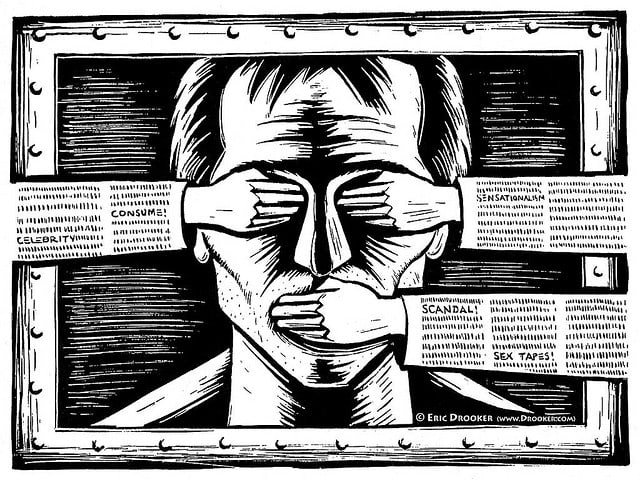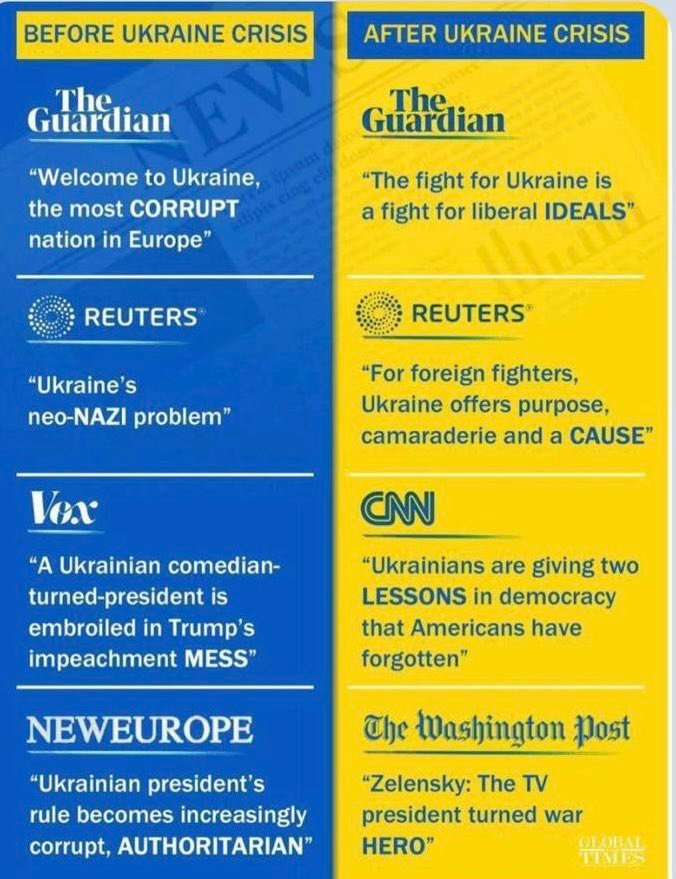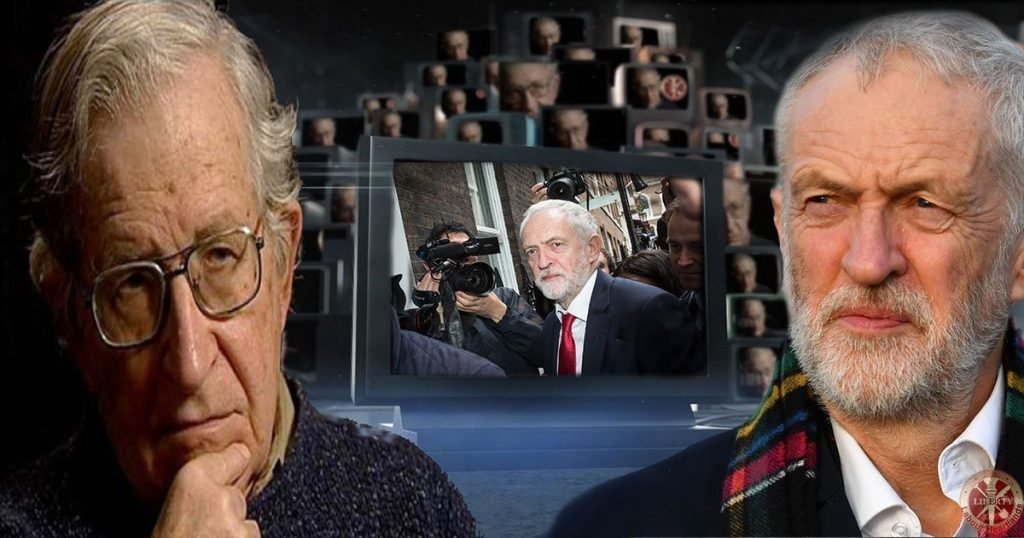Operation Mockingbird: The Subtle Power of State Propaganda in Modern Media
The existence of a truly Free Press immune from elite interests is largely an illusion in today’s society. Too many journalists and outlets are intellectual prostitutes, dutifully parroting official narratives and serving as mouthpieces for the powerful.
The uncomfortable truth is that ostensibly independent media often operate as propaganda proxies, whether consciously or not. Their reporting frequently distorts truth to suit the agendas of politicians, spy agencies, mega-corporations and billionaire owners. Strings are pulled, stories are spun, dissent is marginalised.
This manufactured reality advanced by the media machine keeps people passive and misinformed. Behind the curtain, the oligarchs collude to shape narratives that justify the endless accumulation of wealth and influence at public expense. The orchestrated theatre of partisan politics and 24/7 news outrage conceals the deeper consolidation of power.
Of course, the system denies and defends this manipulated landscape that masquerades as a Free Press. But observant critics recognise how severely huge swaths of coverage serve the so-called elite audiences, not the common citizen.

Journalists, who were meant to be the guardians of truth, can find themselves straddling a fine line between informing the public and serving the interests of those who wield power from the shadows.
The strings of manipulation, pulled by powerful figures, shape narratives and control the direction of discourse. It’s a disheartening realisation that political affiliations, intelligence agencies, corporate entities, and banking institutions can and do influence the media landscape to an extent that objective truth becomes elusive.
The present narrative seems to be one of orchestrated chaos, a carefully constructed tapestry of conflict and turmoil that keeps societies on the brink of collapse. In this landscape, the blame is often pinned on convenient scapegoats, enabling the continued appropriation of public resources for personal gain. It’s a precarious situation, a puzzle that requires a solution born out of clarity and transparency.
It is within that complex theatre that truth often shrouds itself in the shadows of disinformation, weaving a web of perception that can significantly alter public understanding.
In this age where information is abundant and easily accessible, it’s disconcerting to realise that what we perceive as reality may be significantly manipulated by unseen forces.
An illustrative instance is Ukraine, where the Western media had long been shedding light on its entrenched challenges of oligarchic corruption and erosion of democratic values before February 2022. Sceptics voicing these apprehensions underscored the country’s entrenched corruption and its unsettling shift towards far-right influences. However, almost instantaneously, this multifaceted depiction was supplanted by a simplified glorification of Ukraine as an unequivocal symbol of liberty in the face of totalitarian oppression.
Such black and white framing reveals more about Western interests than reality. It demands we uncritically glorify Ukraine while ignoring inconvenient truths. This is the danger of falsely binary propaganda – it denies space for nuance, debate, and accountability.

Of course, none of this is new and while most people have their eyes wide open it is always a good idea to look back at recent history to see how manipulation and disinformation have worked to keep people submissive and maulable.
One such programme arose from the shadows of the Cold War, a vast propaganda apparatus designed to manipulate public understanding – a covert operation known as Mockingbird.
At its height in the 1950s, the CIA had compromised over 400 American journalists to disseminate pro-government narratives under the guise of objective reporting.
Operation Mockingbird stands as a stark reminder of the hidden influence of intelligence agencies on media content. Though lesser-known today, the program’s techniques persist, shaping public perceptions of current events and geopolitics.
This article delves into the depths of Operation Mockingbird, its implications for a free press, and the ongoing consequences of media manipulation on global understanding.
Operation Mockingbird – John Stockwell, CIA agent explains… #MediaManipulation @Labourheartland pic.twitter.com/NG6OCrAymP
— Paul Knaggs (@PaulKnaggs) August 29, 2023
The Cold War Era and Operation Mockingbird
Operation Mockingbird, initiated in the 1950s, was a clandestine operation designed to influence media outlets and journalists. The goal was to shape public opinion by controlling the narrative around crucial events, both domestically and internationally.
Hundreds of journalists were compromised, knowingly or unknowingly, as the CIA covertly sought to disseminate its preferred version of events.
Figures like Noam Chomsky have extensively explored how this manipulation corrodes the principles of a free press, transforming it into a tool for propagating government agendas.
Engineering Beliefs, Not Objectivity
Operation Mockingbird highlights a disturbing reality: State agencies are more interested in engineering beliefs than in objectively informing the public.
By controlling the narrative around crucial events, they can actively shape public perceptions to align with their goals.
This mass manipulation often operates covertly, leading individuals to believe that their opinions are formed independently. However, the truth is that their perspectives have been subtly crafted without their awareness.
Seeking to control the flow of information, the CIA weaponised the media to shape popular narratives on key events, sowing seeds of disinformation through seemingly independent outlets.
The agency actively worked to censor countervailing voices, violating press freedoms to orchestrate a chorus favouring US foreign policy interests.
The Art of Subconscious Influence
The insidious power of disinformation lies in its subtle penetration of the collective consciousness.
Through masterful manipulation, intelligence agencies can manipulate entire populations without raising suspicion.
Operation Mockingbird’s success lies in its ability to remain invisible, its influence perceived as the result of personal contemplation rather than systemic indoctrination.
As a result, people are unwittingly bound by narratives that serve specific interests.
Journalists as Mouthpieces: A Disturbing Reality
Perhaps the most disheartening aspect of Operation Mockingbird is its co-opting of journalists who were meant to uncover the truth.
These professionals were unwittingly turned into mouthpieces for intelligence agencies, sowing seeds of deception under the guise of authenticity.
Mockingbird inflicted deep wounds on journalistic integrity that linger today.
The deployment of media as propaganda proxy, the collusion between government and corporate press, and the suppression of dissenting perspectives remain constant threats.
Now, the national security state wields increasingly sophisticated tactics to influence online discourse as well.
This phenomenon raises alarming questions about the extent to which media outlets can be manipulated and how effectively they can report the unbiased truth.
Awakening to Manipulation: A Necessary Endeavor
Breaking free from the chains of covert manipulation demands a collective awakening.
Understanding the mechanisms of groupthink, recognizing implanted narratives, and developing critical thinking skills are essential steps towards unravelling the grip of Operation Mockingbird-like techniques.
Only through self-awareness can individuals resist the unconscious pull of programmed beliefs and defend the sanctity of their minds.
Operation Mockingbird serves as a chilling reminder that we inhabit a reality defined by narratives designed to serve powerful vested interests.
There is little doubt that Operation Mockingbird’s legacy endures, as covert propaganda continues to influence the public’s perception of global events.
The struggle for truth and transparency persists in the face of this manipulation, and the path to mass awakening remains challenging.
However, as long as individuals strive to discern the difference between reality and manipulation, there is hope.
In a world where truth contends with deception, the power of a vigilant and informed citizenry remains an unwavering beacon of possibility.
But in the end, people recognise theatre when they see it. A mass awakening to the stagecraft threatens to collapse this house of cards. When the audience revolts against bad fiction, the entire production fails. To reclaim the media, we must first reclaim our critical faculties from these professional prevaricators who treat truth as infinitely malleable.

These are just a few examples of the ways in which Western states have knowingly given out false information to the public. This is a serious problem that undermines trust in government and democracy.
- The Zinoviev letter in 1924, which was a forged letter published by the British government to suggest Soviet interference in British politics. It helped contribute to the defeat of the first Labour government.
- During WWII, the British government suppressed early reports about the Holocaust and the systematic killing of Jews and other groups by Nazi Germany. It has been argued they did this to avoid generating sympathy for increasing immigration.
- In the early 1950s, the UK tested chemical and biological weapons on British servicemen without their consent, and kept it secret for decades. When information emerged, the government denied it.
- In the 1950s and 60s, the UK government denied harmful effects from nuclear testing it was conducting in Australia and islands in the Pacific Ocean. Declassified documents later showed evidence of health and environmental damage was suppressed.
- A few hours after John F. Kennedy had been killed, Hal Hendrix provided background information to a colleague, Seth Kantor, about Lee Harvey Oswald. This included details of his defection to the Soviet Union and his work for the Fair Play for Cuba Committee. This surprised Kantor because he had this information before it was released by the Federal Bureau of Investigation later that evening.
- The Gulf of Tonkin incident, in which the US government falsely claimed that North Vietnamese torpedo boats had attacked US ships in the Gulf of Tonkin in 1964. This incident was used as a pretext for the US to escalate its involvement in the Vietnam War.
- In the 1970s, an MI5 operation placed agents in left-wing groups to monitor and disrupt their activities. This was denied at the time but later admitted.
- Claims made by the government following the Hillsborough disaster about the role of Liverpool fans in causing the crush. Later investigations found police and emergency services bore responsibility.
- Sexed-Up Dossier on Iraq: The UK government under Prime Minister Tony Blair released a dossier in 2002 that claimed Iraq could launch WMDs within 45 minutes. The dossier was criticized for being “sexed-up” and for presenting selective and misleading information.
- Iraq War and Weapons of Mass Destruction (WMDs): The UK and the US justified the invasion of Iraq in 2003 based on intelligence that claimed Iraq possessed WMDs. However, these claims were later found to be inaccurate, leading to widespread criticism and accusations of manipulating intelligence to support the military intervention.
- Iraqi Soldiers Throwing Babies from Incubators: During the Gulf War in 1990, a testimony by a Kuwaiti woman about Iraqi soldiers removing babies from incubators and leaving them to die was widely publicized. It later emerged that this testimony was fabricated and part of a PR campaign to drum up support for the war.
- False Justification for Invasion of Afghanistan: The UK, along with the US, invaded Afghanistan in 2001, citing the need to eliminate Al-Qaeda and its leader Osama bin Laden. However, subsequent investigations revealed that bin Laden was not present in Afghanistan during the invasion.
- False Intelligence on Libyan Civil War: In 2011, the UK and its allies used unverified intelligence to support military intervention in Libya. Among the claims was the assertion that Libyan leader Muammar Gaddafi’s forces were engaging in mass rapes, which was later found to be unsubstantiated.
- Assassination of Jean Charles de Menezes: In 2005, UK police shot and killed Brazilian Jean Charles de Menezes, wrongly identifying him as a suspect involved in the London bombings. Initial reports falsely stated that he was wearing a bulky jacket, which raised suspicions.
- Mass Surveillance and Privacy: In 2013, whistleblower Edward Snowden revealed that US and UK intelligence agencies, including GCHQ, were involved in mass surveillance programs. The UK government had previously denied the extent of its surveillance activities.
- The war in Ukraine, in which both sides have been accused of spreading disinformation. This has made it difficult for people to understand what is really happening in the conflict.
- The US government’s use of propaganda to promote its own interests. This includes the use of covert media outlets, such as Radio Free Europe, to spread pro-American messages.
- The US government’s use of censorship to suppress dissent. This includes the prosecution of journalists such as Julian Assange and whistle-blowers like Edward Snowden and Chelsea Manning who expose government wrongdoing.
- A report found that 75% of press coverage misrepresents Jeremy Corbyn – we can’t ignore media bias
These examples and many many more just skim the surface, of course, the best manipulations are the ones we can never prove.
According to researchers such as Steve Kangas, Angus Mackenzie and Alex Constantine, Operation Mockingbird was not closed down by the CIA. the reality is Mockingbird or any number of its verities are still being executed today.
Help Us Sustain Ad-Free Journalism
Sorry, I Need To Put Out the Begging Bowl
Independent Journalism Needs You
Our unwavering dedication is to provide you with unbiased news, diverse perspectives, and insightful opinions. We're on a mission to ensure that those in positions of power are held accountable for their actions, but we can't do it alone. Labour Heartlands is primarily funded by me, Paul Knaggs, and by the generous contributions of readers like you. Your donations keep us going and help us uphold the principles of independent journalism. Join us in our quest for truth, transparency, and accountability – donate today and be a part of our mission!
Like everyone else, we're facing challenges, and we need your help to stay online and continue providing crucial journalism. Every contribution, no matter how small, goes a long way in helping us thrive. By becoming one of our donors, you become a vital part of our mission to uncover the truth and uphold the values of democracy.
While we maintain our independence from political affiliations, we stand united against corruption, injustice, and the erosion of free speech, truth, and democracy. We believe in the power of accurate information in a democracy, and we consider facts non-negotiable.
Your support, no matter the amount, can make a significant impact. Together, we can make a difference and continue our journey toward a more informed and just society.
Thank you for supporting Labour Heartlands












